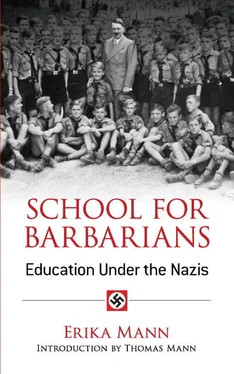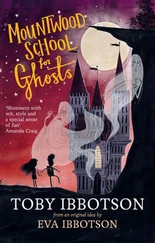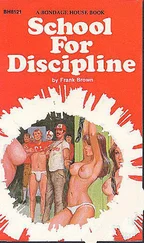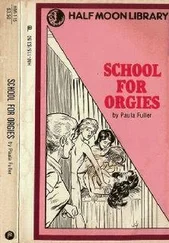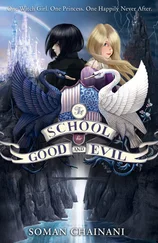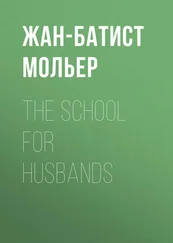You leave the house in the morning, “Heil Hitler” on your lips; and on the stairs of your apartment house you meet the Blockwart. A person of great importance and some danger, the Blockwart has been installed by the government as a Nazi guardian. He controls the block, reporting on it regularly, checking up on the behavior of its residents. It’s worth it to face right about, military style, and to give him the “big” Hitler salute, with the right arm as high as it will go. All the way down the street, the flags are waving, every window colored with red banners, and the black swastika in the middle of each. You don’t stop to ask why; it’s bound to be some national event. Not a week passes without an occasion on which families are given one reason or another to hang out the swastika. Only the Jews are excepted under the strict regulation. Jews are not Germans: they do not belong to the “Nation,” they can have no “national events.”
You meet the uniforms on the way to school: the black S.S. men, the men of the Volunteer Labor Service, and the Reichswehr soldiers. And if some of the streets are closed, you know that an official is driving through town. Nobody has ever told you that the high officials of other countries pass without the precautions of closed streets.
And here, where a building is going up, the workmen are gone — probably because of the “national event.” But the sign is on the scaffolding: “We have our Führer to thank that we are working here today. Heil Hitler!” The familiar sign, seen everywhere with men at work, on roads, barracks, sport fields. What does it mean to you? Do you think of a world outside, with workers who need not thank a Führer for their jobs? Certainly not — what you have, imprinted on your mind, is the sentence, deep and accepted as an old melody.
There are more placards as you continue past hotels, restaurants, indoor swimming pools, to school. They read “No Jews allowed” — “Jews not desired here” — “Not for Jews.” And what do you feel? Agreement? Pleasure? Disgust? Opposition? You don’t feel any of these. You don’t feel anything, you’ve seen these placards for almost five years. This is a habit, it is all perfectly natural, of course Jews aren’t allowed here. Five years in the life of a child of nine — that’s his life, after four years of infancy, his whole personal, conscious existence.
* * *
Through the Nazi streets walks the Nazi child. There is nothing to disturb him, nothing to attract his attention or criticism. The stands sell Nazi papers almost exclusively; all German papers are Nazi; foreign papers are forbidden, if they do not please the men at the top. The child won’t be surprised at their huge headlines: “UNHEARD-OF ACTS OF VIOLENCE AGAINST GERMANY IN CZECHOSLOVAKIA!” “JEWISH GANGSTERS RULE AMERICA!” “THE COMMUNIST TERROR IN SPAIN SUPPORTED BY THE POPE!” “150 MORE PRIESTS UNMASKED AS SEXUAL CRIMINALS!”
“That’s how it is in the world,” the child thinks. “What luck we’re in, to have a Führer! He’ll tell the whole bunch — Czechs, Jews, Americans, Communists and priests — where to get off!”
There are no doubts, no suspicion at the coarse and hysterical tone of the dispatches, no hint that they may be inexact or false. No, these things are part of the everyday world of the Nazis, like the Blockwart, the swastika, the signs reading “No Jews allowed.” They add up to an atmosphere that is torture, a fuming poison for a free-born human being.
The German child breathes this air. There is no other condition wherever Nazis are in power; and here in Germany they do rule everywhere, and their supremacy over the German child, as he learns and eats, marches, grows up, breathes, is complete.
But, past the general influence of Nazi atmosphere, three special influences in the Reich determine the life of the child: the intimate circle of the family, the school, and the Hitler youth organizations.
THE TWO SLOGANS BEST used between 1919 and 1933 by the rising National Socialist movement were: “With the help of National Socialism we shall rescue religion from the threat of Bolshevism!” and “With the help of National Socialism we shall rescue the family from Bolshevism, which is trying to destroy it!”
They struck home in Germany, appealing as they did to two prime concepts. Even at the outset, National Socialism knew very well what it was about when it frightened the great bulk of the German middle class with the warning that Bolshevism would destroy religion, and so annul all the rights of conscience; that it would tear the family apart and offer up its members to an all-powerful government; that it would deify this monster State in place of religion. The middle-class German, traditionally a religious family-man, listened with horror to all of this. Shopkeeper, caretaker’s wife, married office girl, and well-brought-up society woman — they all agreed to support the National Socialists who desired to protect religion and the family, and who ought to be strengthened in their work.
Hans Schlemm, who in 1933 became Bavarian Minister of Education, published a challenging pamphlet two years before Hitler made himself Chancellor. He called it Mother or Comrade. Here were all the praises of the family as a unit, its rights under the state, and the individual rights of “millions of separate personalities.” And he condemned the “completely automatic, mechanically-functioning ‘mass-apparatus.’ ”
Today we regard with historical curiosity the eagerness of the man, denouncing as “Bolshevistic” the plans and ideas about to be realized in Germany by the National Socialists who later made him their Minister of State. We may replace the emblems with ‘swastika” in this passage by Schlemm, who wrote under the heading “Religion — Family”: “Brutal measures initiated this struggle [against religion]…. The cross and pictures of saints were replaced by the Soviet star, the red flag, the hammer and the sickle…” and we have an accurate picture of the daily battle against religion in Germany. “Of course,” Schlemm continues, “it is impossible to survey the process of destruction to which the family is subjected. But the family as an institution cannot be destroyed until the citadel has been razed which protects that precious jewel: the strong walls of prayer, of faith in God…. On a road of stifled prayers, Bolshevism beat its way into the life-center of the people — the family.”
Again, all we have to do is replace “Bolshevism” with “National Socialism” to have a fairly exact picture. The Nazis recognized, to their own use, that the ideology of the German citizen was fixed by two concepts: “fear of God,” and “family.” Both of these had to be attacked if either one was to be destroyed.
“It is not merely a matter of economical, financial, technical or political measures… or the socialization of goods… oh, no, it is a matter of human dignity as such. The question is this: shall free human beings be transformed into a horde of slaves?”
And, writing these words, expressing this most individualistic, democratic cry of warning, seeing so clearly what the Nazis were preparing (as far back as 1931) —was the Nazi Hans Schlemm.
One of the surprises of the National Socialist Revolution was the speed with which signs and names were altered in 1933, when it was possible to call anything black that, a week ago, had been painted white. “Save the family!” the Nazis had been shouting. “Save religion!” They knew they would have to destroy both. And they came into power, disguised as saviors, and took hold of the German family and religion, hoping to be undetected while they did away with both.
Читать дальше
